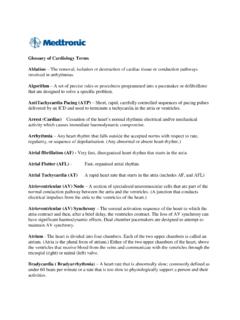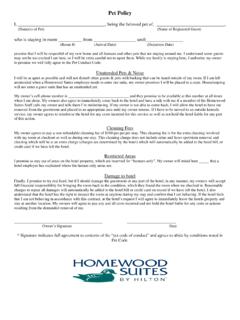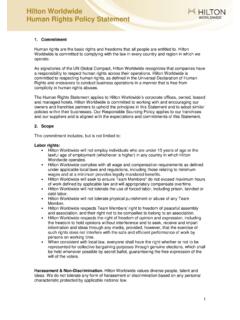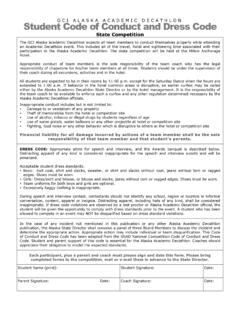Transcription of Hilton Hotels Corporation Code of Business …
1 Hilton Hotels Corporation code of Business conduct and Ethics I. Introduction The Board of Directors of Hilton Hotels Corporation (with its subsidiaries, the Company ) has adopted this code of Business conduct and ethics (this code ) to: promote honest and ethical conduct , including fair dealing and the ethical handling of conflicts of interest; promote full, fair, accurate, timely and understandable disclosure; promote compliance with applicable laws and governmental rules and regulations; promote prompt internal reporting of violations of this code ; ensure the protection of the Company s legitimate Business interests, including corporate opportunities, assets and confidential information; and deter wrongdoing.
2 All directors, officers and employees of the Company are expected to be familiar with the code and to adhere to those principles and procedures set forth in the code that apply to them. The Company s more detailed policies and procedures set forth in the Hilton Hotels Corporation code of conduct are separate requirements applying to officers and employees of the Company and are not part of this code . II. Honest and Candid conduct Each director, officer and employee owes a duty to the Company to act with integrity. Integrity requires, among other things, being honest and candid.
3 Deceit and subordination of principle are inconsistent with integrity. Each director, officer and employee must: Act with integrity, including being honest and candid while still maintaining the confidentiality of information where required or consistent with the Company s policies. Observe both the form and spirit of laws and governmental rules and regulations, accounting standards and Company policies. Adhere to a high standard of Business ethics. III. Conflicts of Interest A conflict of interest occurs when an individual s private interest interferes or appears to interfere with the interests of the Company.
4 A conflict of interest can arise when a director, { ; 1} 2 officer or employee takes actions or has interests that may make it difficult to perform his or her Company work objectively and effectively. For example, a conflict of interest would arise if a director, officer or employee, or a member or his or her family, receives improper personal benefits as a result of his or her position in the Company. Any material transaction or relationship that could reasonably be expected to give rise to a conflict of interest should be discussed with the General Counsel, except with respect to the Chief Executive Officer, in which case it should be discussed with the chair of the Audit Committee.
5 Service to the Company should never be subordinated to personal gain and advantage. Conflicsts of interest should, whenever possible, be avoided. In particular, clear conflict of interest situations involving executive officers and other employees who occupy supervisory positions or who have discretionary authority in dealing with any third party specified below may include the following: any significant ownership interest in any supplier, customer or client; any consulting or employment relationship with any customer, client, supplier or competitor; any outside Business activity that detracts from an individual s ability to devote appropriate time and attention to his or her responsibilities with the Company; the receipt of non-nominal gifts or excessive entertainment from any company with which the Company has current or prospective Business dealings; being in the position of supervising, reviewing or having any influence on the job evaluation, pay or benefit of any immediate family member.
6 And selling anything to the Company or buying anything from the Company, except on the same terms and conditions as comparable directors, officers or employees are permitted to so purchase or sell. Such situations, if material, should always be discussed with the General Counsel. Anything that would present a conflict for a director, officer or employee would likely also present a conflict if it is related to a member of his or her family. IV. Disclosure Each director, officer or employee involved in the Company s disclosure process, including the chief executive officer, the chief financial officer, the chief accounting officer and the controller (the Senior Financial Officers ), is required to be familiar with and comply with the Company's disclosure controls and procedures and internal control over financial reporting, to the extent relevant to his or her area of responsibility, so that the Company's public reports and documents filed with the Securities and Exchange Commission (the SEC )
7 Comply in all material respects with the applicable federal securities laws and SEC rules. In addition, each such person having direct or supervisory authority regarding these SEC filings or the Company's other public communications concerning its general Business , results, financial condition and prospects should, to the extent appropriate within his or her area of responsibility, consult with other { ; 1} 3 Company officers and employees and take other appropriate steps regarding these disclosures with the goal of making full, fair, accurate, timely and understandable disclosure.
8 Each director, officer or employee who is involved in the Company s disclosure process, including without limitation the Senior Financial Officers, must: Familiarize himself or herself with the disclosure requirements applicable to the Company, as well as the Business and financial operations of the Company. Not knowingly misrepresent, or cause others to misrepresent, facts about the Company to others, whether within or outside the Company, including to the Company s independent auditors, governmental regulators and self-regulatory organizations. Properly review and critically analyze proposed disclosure for accuracy and completeness (or, where appropriate, delegate this task to others).
9 V. Compliance It is the Company s policy to comply with all applicable laws and governmental rules and regulations. It is the personal responsibility of each director, officer and employee to adhere to the standards and restrictions imposed by those laws, rules and regulations, including those relating to accounting and auditing matters. It is against Company policy and a violation of federal securities laws for a director, officer or employee to trade in securities on the basis of material information not yet publicly disclosed. Any director, officer or employee who possesses nonpublic information about the Company or its Business which is material in nature may not trade in any securities affected by such nonpublic information, including the Company's securities, until such time as the information has been made known to the public.
10 A material fact about a company is one that a reasonable investor would be likely to consider important in making a decision to buy, sell or hold the securities of such company. Any director, officer or employee who is uncertain about the legal rules involving a purchase or sale of any Company securities or any securities in companies that he or she is familiar with by virtue of his or her work for the Company, should consult the General Counsel before making any such purchase or sale. VI. Reporting and Accountability The Corporate Governance and Nominating Committee is responsible for applying this code to specific situations in which questions are presented to it and has the authority to interpret this code in any particular situation.











